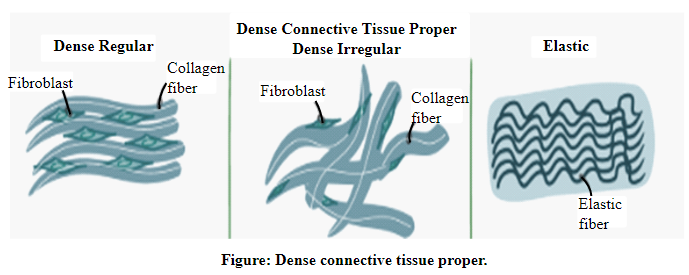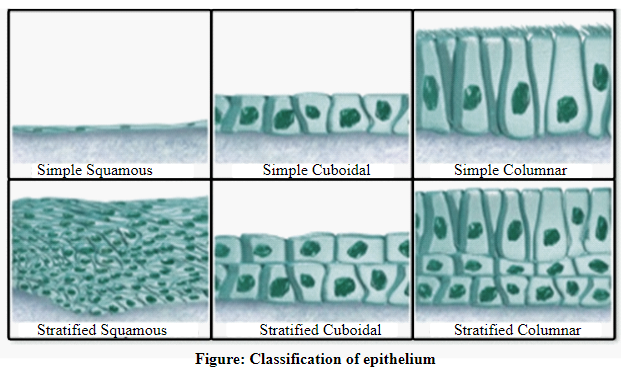
Concept explainers
Explain how connective tissues differ from epithelial tissues in structure and function.
To review:
The difference between connective tissues and epithelial tissues, based on their structure and function.
Introduction:
Tissues are a group of cells that have a specific function. In a living organism, tissues are of four types, namely, epithelial tissue, connective tissue, muscle tissue, and connective tissue. The function and structure of these tissues vary from each other.
Explanation of Solution
The difference between connective tissues and epithelial tissues is given in the following table:
| Connective tissue | Epithelial tissue |
| This group of tissues connects different tissues with each other. | Epithelial tissue is the most abundant tissue as it covers the cavities and the surface of the body. |
| They have an extracellular matrix (ECM) where cells are scattered. Fibers and ground substances, are important structural parts of ECM. | The cells are arranged in a sheet-like manner with little ECM. There are no blood vessels in epithelial tissues. |
| Connective tissues are classified into proper connective tissue and specialized connective tissue. | Based on the tissue layer, epithelial tissues can be classified into simple and stratified. Simple epithelia have a single layer, whereas stratified epithelia have more than one layer. |
| Specialized connective tissues are cartilage, bone, and blood. Proper connective tissues are again classified into loose connective tissues, dense connective tissues, reticular tissues, and adipose tissues. | They are seen in three different principal shapes, namely, squamous, columnar, and cuboidal. |
| Blood is an example of a connective tissue. It transports nutrients and oxygen to various organs. Connective tissues provide support to our skeletal system. An example of a connective tissue that provides support is cartilage and dense connective tissue. | Epithelial tissues act as a barrier against mechanical and thermal injury. The best example is skin. |
The diagrams showing the structures of different types of connective and epithelial tissues are shown below:




Thus, it can be concluded that the two tissue classifications, namely, epitheliumand connective tissues, play a major role in the defense mechanism of the body. Based on their composition, they can also be further classified into different types.
Want to see more full solutions like this?
Chapter 4 Solutions
Human Anatomy & Physiology (2nd Edition)
- fa How many different gametes, f₂ phenotypes and f₂ genotypes can potentially be produced from individuals of the following genotypes? 1) AaBb i) AaBB 11) AABSC- AA Bb Cc Dd EE Cal bsm nortubaarrow_forwardC MasteringHealth MasteringNu × session.healthandnutrition-mastering.pearson.com/myct/itemView?assignment ProblemID=17396416&attemptNo=1&offset=prevarrow_forward10. Your instructor will give you 2 amino acids during the activity session (video 2-7. A. First color all the polar and non-polar covalent bonds in the R groups of your 2 amino acids using the same colors as in #7. Do not color the bonds in the backbone of each amino acid. B. Next, color where all the hydrogen bonds, hydrophobic interactions and ionic bonds could occur in the R group of each amino acid. Use the same colors as in #7. Do not color the bonds in the backbone of each amino acid. C. Position the two amino acids on the page below in an orientation where the two R groups could bond together. Once you are satisfied, staple or tape the amino acids in place and label the bond that you formed between the two R groups. - Polar covalent Bond - Red - Non polar Covalent boND- yellow - Ionic BonD - PINK Hydrogen Bonn - Purple Hydrophobic interaction-green O=C-N H I. H HO H =O CH2 C-C-N HICK H HO H CH2 OH H₂N C = Oarrow_forwardFind the dental formula and enter it in the following format: I3/3 C1/1 P4/4 M2/3 = 42 (this is not the correct number, just the correct format) Please be aware: the upper jaw is intact (all teeth are present). The bottom jaw/mandible is not intact. The front teeth should include 6 total rectangular teeth (3 on each side) and 2 total large triangular teeth (1 on each side).arrow_forward12. Calculate the area of a circle which has a radius of 1200 μm. Give your answer in mm² in scientific notation with the correct number of significant figures.arrow_forwardDescribe the image quality of the B.megaterium at 1000X before adding oil? What does adding oil do to the quality of the image?arrow_forwardWhich of the follwowing cells from this lab do you expect to have a nucleus and why or why not? Ceratium, Bacillus megaterium and Cheek epithelial cells?arrow_forward14. If you determine there to be debris on your ocular lens, explain what is the best way to clean it off without damaging the lens?arrow_forward11. Write a simple formula for converting mm to μm when the number of mm's is known. Use the variable X to represent the number of mm's in your formula.arrow_forward13. When a smear containing cells is dried, the cells shrink due to the loss of water. What technique could you use to visualize and measure living cells without heat-fixing them? Hint: you did this technique in part I.arrow_forward10. Write a simple formula for converting μm to mm when the number of μm's are known. Use the variable X to represent the number of um's in your formula.arrow_forward8. How many μm² is in one cm²; express the result in scientific notation. Show your calculations. 1 cm = 10 mm; 1 mm = 1000 μmarrow_forwardarrow_back_iosSEE MORE QUESTIONSarrow_forward_ios
 Human Biology (MindTap Course List)BiologyISBN:9781305112100Author:Cecie Starr, Beverly McMillanPublisher:Cengage Learning
Human Biology (MindTap Course List)BiologyISBN:9781305112100Author:Cecie Starr, Beverly McMillanPublisher:Cengage Learning Human Physiology: From Cells to Systems (MindTap ...BiologyISBN:9781285866932Author:Lauralee SherwoodPublisher:Cengage Learning
Human Physiology: From Cells to Systems (MindTap ...BiologyISBN:9781285866932Author:Lauralee SherwoodPublisher:Cengage Learning
 Biology: The Unity and Diversity of Life (MindTap...BiologyISBN:9781305073951Author:Cecie Starr, Ralph Taggart, Christine Evers, Lisa StarrPublisher:Cengage Learning
Biology: The Unity and Diversity of Life (MindTap...BiologyISBN:9781305073951Author:Cecie Starr, Ralph Taggart, Christine Evers, Lisa StarrPublisher:Cengage Learning





